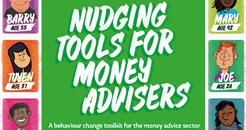 Nudging tools for money advisers
Nudging tools for money advisers
In July 2017, The Money Advice Trust launched the ‘Nudging Tools for Money Advisers’ toolkit, which uses behavioural science to better engage and support people with unmanageable debt.
The toolkit consists of 6 'nudges' that were distributed to and trialed by money advisers and financial inclusion officers across 5 Housing Associations.
The nudges are:
-
Envelope stickers - clients often avoid opening official looking letters. Could bright, friendly stickers encourage them to open the debt advisor's letters?
-
Case Study cards - helping clients see others have faced similar problems and been helped by debt advice. Builds confidence in taking action.
-
Case Study films - Youtube videos for potential clients to watch before seeking advice. Builds confidence to seek advice.
-
Text Message suggestions - increasing engagement and reminding.
-
Action Cards - wallet sized cards focused on priority actions as a reminder for a client.
-
Action Chart - short list of actions to print out and give to a client.
The toolkit is aimed to complement the expertise and empathy of those working with people in debt so that such advice ‘lands’ as intended with the people supported. Organisations can adapt and make the tools their own, in their specific context.
What was the impact of using the toolkit in the trials?
Client engagement in one project increased to 82%, compared to 60% before. Another project saw a 20% rise in their clients taking actions as a result of introducing the nudge techniques alongside their telephone support. Another saw their 'no show' decrease by 30%.
Every context will be different, and require a slightly different approach. The tools work best when tailored to people in different circumstances to understand what works for that context e.g. people who experience mental health problems, as well as at which points these tools can be most effective.
Introducing nudge tools may also require organisations to support their staff and volunteers to adopt new ways of doing things. Many advisers use their own techniques to engage people, often adapting their approaches to make the support/advice appropriate at a very personal level. Sometimes, these techniques can be inconspicuous, and can work very well as they are based on a wealth of experience. These tools can be adapted to support existing good work, building on advisers’ own expertise and thoughts on how they might apply.
Download toolkit overview here.
The design files to any of the tools within the toolkit can be requested from Behaviour Change.
Retweet about this article:
Geoff Knott, 26/09/2017